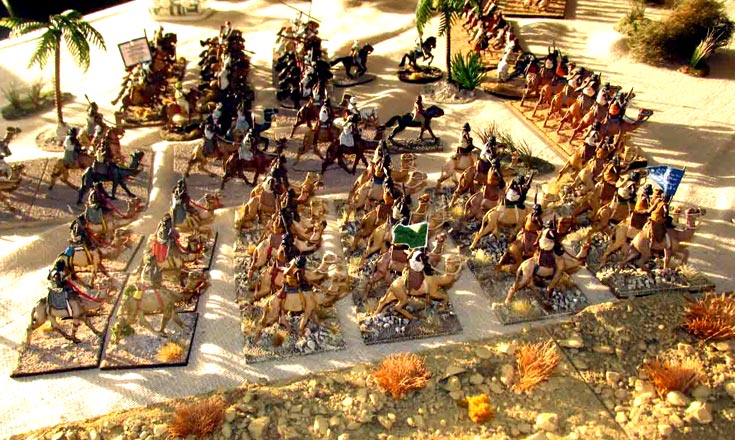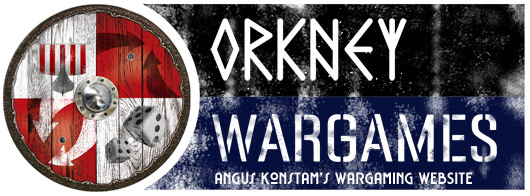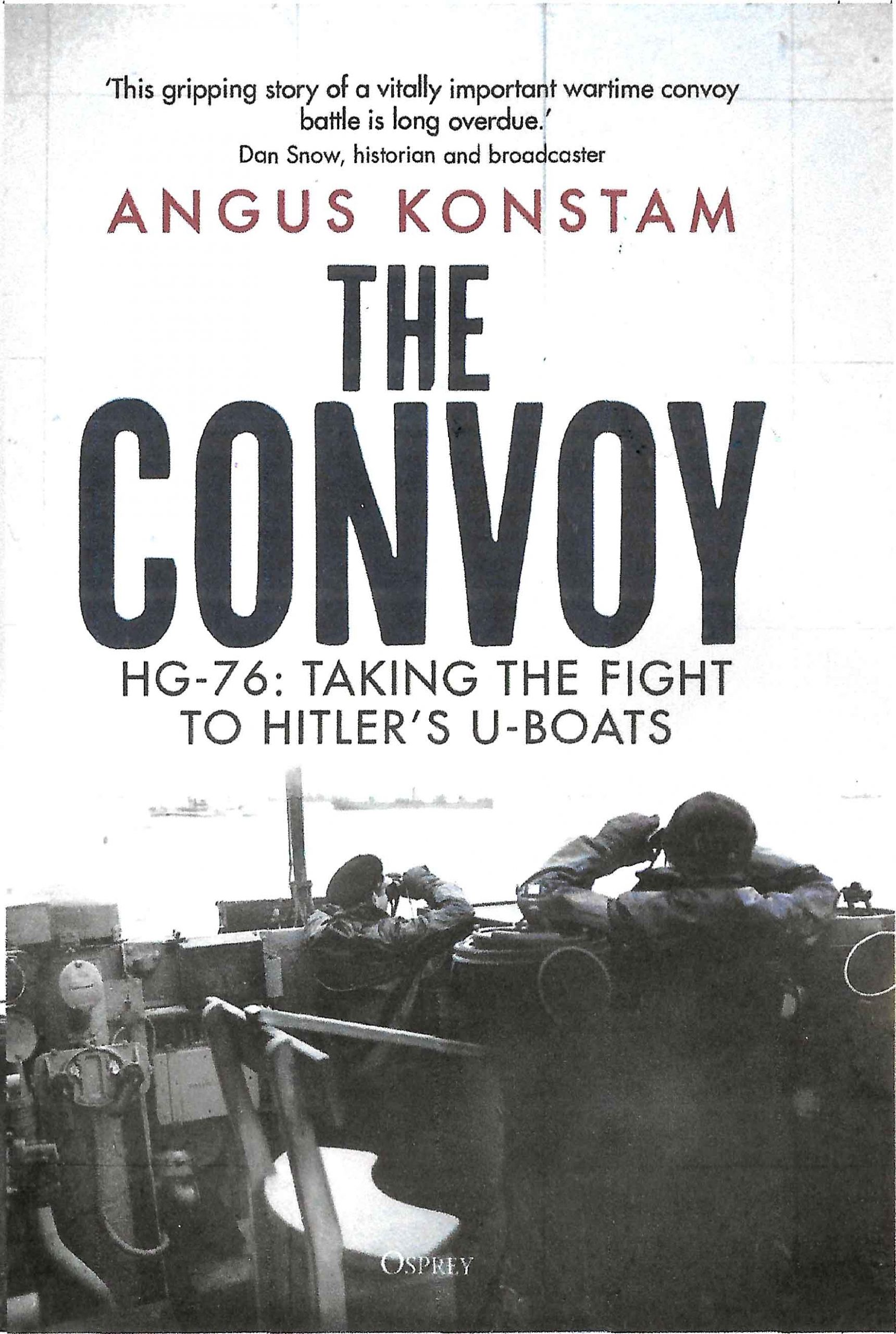
Khartoum, 1885
14th November 2014, 0 Comments
Queen Victoria’s Little Wars, Black Powder, 28mm
This weekend game was run by the AB1 crowd (which stands for “Anything but a 1”). We lay on games twice a year in a hotel in Lundin Links, Fife, and this time we were off to the Sudan. I was later arriving at the first game, as I stopped off at Targe 2014 on my way south (see below). On the Saturday there were two tables – the one below is the battlefield for the river column, which marched along the banks of the River Nile. There was also a desert column table, fought on a more open desert table. My Mahdists took part in the river column game, but by the time I arrived the writing was already on the wall for the British. As they advanced markers were being moved around the table – either dummy ones, or ones that hid a great big pile of Mahdists. When I arrived the column was already in trouble, having lost two of its six units. My Beja tribesmen duly appeared behind the British front line, having marched in from the desert flank.
As they advanced markers were being moved around the table – either dummy ones, or ones that hid a great big pile of Mahdists. When I arrived the column was already in trouble, having lost two of its six units. My Beja tribesmen duly appeared behind the British front line, having marched in from the desert flank. Any hope of support from the two river gunboats was quashed when the first one ran into an ambush – a hidden battery of Mahdist guns. In the duel that followed the gunboats was damaged and then sunk. The remaining gunboat kept running aground, and only made an effective appearance in the final moments of the game. By then my Beja charged the British from one side, and Dave Imrie’and Jack Glanville led the charging Mahdists facing the British front. the result was a foregone conclusion – one after another the British units were charged, overwhelmed and slaughtered.
Any hope of support from the two river gunboats was quashed when the first one ran into an ambush – a hidden battery of Mahdist guns. In the duel that followed the gunboats was damaged and then sunk. The remaining gunboat kept running aground, and only made an effective appearance in the final moments of the game. By then my Beja charged the British from one side, and Dave Imrie’and Jack Glanville led the charging Mahdists facing the British front. the result was a foregone conclusion – one after another the British units were charged, overwhelmed and slaughtered. In the end only one unit escaped, and they only made it to safety by running to the river and jumping on the gunboat. Over on the desert column table the British fared better, but were unable to cut their way through the Mahdist hordes. This had a dramatic impact on the game the following day – the assault on Khartoum. Without reinforcements from the river column the defenders were pretty much left to their own devices.On Sunday morning we trooped into the hotel function room to play the Khartoum game. The city was ringed by walls, with the exception of the side facing the River Nile, where the defences were non existent. Instead the British had built a line of raised earthworks, stretching from the walls of the city to the river. A British brigade held this vulnerable gap, while the Egyptians manned the walls of Khartoum itself. The only reinforcements the British and Egyptian players could expect was that solitary gunboat, carrying its single battalion of British infantry.
In the end only one unit escaped, and they only made it to safety by running to the river and jumping on the gunboat. Over on the desert column table the British fared better, but were unable to cut their way through the Mahdist hordes. This had a dramatic impact on the game the following day – the assault on Khartoum. Without reinforcements from the river column the defenders were pretty much left to their own devices.On Sunday morning we trooped into the hotel function room to play the Khartoum game. The city was ringed by walls, with the exception of the side facing the River Nile, where the defences were non existent. Instead the British had built a line of raised earthworks, stretching from the walls of the city to the river. A British brigade held this vulnerable gap, while the Egyptians manned the walls of Khartoum itself. The only reinforcements the British and Egyptian players could expect was that solitary gunboat, carrying its single battalion of British infantry. I was put in charge of the Mahdists (“Team Fuzzy”), and we decided to attack all along the walls, or rather to storm the eastern side, while our guns blew in the gate on the southern side of the city. Over to the west, facing the Nile, Dave Imrie and I took command of the Beja tribesmen, whose job it was to storm the line of entrenchments, and take on the British. Once the gate was blown our reserves would rush the gate, supported by a whole pile of warriors on camels, whose job was to rush into the city before the Egyptians knew what hit them. That, at least, was the plan.
I was put in charge of the Mahdists (“Team Fuzzy”), and we decided to attack all along the walls, or rather to storm the eastern side, while our guns blew in the gate on the southern side of the city. Over to the west, facing the Nile, Dave Imrie and I took command of the Beja tribesmen, whose job it was to storm the line of entrenchments, and take on the British. Once the gate was blown our reserves would rush the gate, supported by a whole pile of warriors on camels, whose job was to rush into the city before the Egyptians knew what hit them. That, at least, was the plan. The assault got off to a good start thanks to some low command dice rolls in the first few turns. Bart Zynda’s Mahdists were first to reach the walls on the north-east side of the city, where the Egyptian defences were weakest. Scaling ladders and ropes were produced, and the Mahdists scaled the walls, and were soon fighting hand-to-hand on the parapet. After a turn of this the Egyptians broke and ran, leaving the Mahdists with their first foothold in the city. To the south the attack went in at a more leisurely pace, but the advance towards the walls was reasonably uneventful. To their left the mass of camels hung around waiting for their big moment, but the Mahdist artillery shooting was appalling, and the gates remained resolutely intact.
The assault got off to a good start thanks to some low command dice rolls in the first few turns. Bart Zynda’s Mahdists were first to reach the walls on the north-east side of the city, where the Egyptian defences were weakest. Scaling ladders and ropes were produced, and the Mahdists scaled the walls, and were soon fighting hand-to-hand on the parapet. After a turn of this the Egyptians broke and ran, leaving the Mahdists with their first foothold in the city. To the south the attack went in at a more leisurely pace, but the advance towards the walls was reasonably uneventful. To their left the mass of camels hung around waiting for their big moment, but the Mahdist artillery shooting was appalling, and the gates remained resolutely intact. Over at my side of the table nearest the Nile Dave Imrie’s Beja hung back slightly, and my warriors made it to the entrenchments first. I was surprised to find them undefended. Instead the British formed a firing line just behind them, and began shooting as soon as we crested the top of the earthworks. The reason they were unoccupied then became clear. They were mined with hundreds of tons of explosives. Once they blew up a second charge on the Nile side of the line would blow the dam keeping tire river at bay, and water would flood in, turning the entrenchments into an impassable moat. All the British player needed was to roll anything but “1”. Guess what the roll was? The charges duly failed to go off, and the Fuzzy Wuzzy hordes swarmed over the earthworks, and headed towards the waiting – and now rather nervous – British. The British player was still cursing – saying some thieving Arab had stolen the wire – but it was not time for short-range volleys and bayonet work rather than engineering gimmicks.
Over at my side of the table nearest the Nile Dave Imrie’s Beja hung back slightly, and my warriors made it to the entrenchments first. I was surprised to find them undefended. Instead the British formed a firing line just behind them, and began shooting as soon as we crested the top of the earthworks. The reason they were unoccupied then became clear. They were mined with hundreds of tons of explosives. Once they blew up a second charge on the Nile side of the line would blow the dam keeping tire river at bay, and water would flood in, turning the entrenchments into an impassable moat. All the British player needed was to roll anything but “1”. Guess what the roll was? The charges duly failed to go off, and the Fuzzy Wuzzy hordes swarmed over the earthworks, and headed towards the waiting – and now rather nervous – British. The British player was still cursing – saying some thieving Arab had stolen the wire – but it was not time for short-range volleys and bayonet work rather than engineering gimmicks. The volleys stopped my Beja in their tracks, causing widespread disorder. However, Dave Imrie’s tribesmen had now reached the wall, and it was clear that the British were badly outnumbered. We went forward again, and although we were stopped once more we inflicted a few casualties, and overran a Gardner gun. More importantly my Beja had worked their way around the flank, and occupied a small round tower guarding the river. They used it as a strongpoint, from which they fired into the flank of the British line. The British were also distracted by Jack Glanville’s river crossings. Using dhows he began ferrying Mahdists across the river- or rather he did until the gunboat showed up. He then became embroiled in a little private war with the gunboat, and was doing pretty well, knocking out its main gun, and keeping it from firing on the main Dervish attack.
The volleys stopped my Beja in their tracks, causing widespread disorder. However, Dave Imrie’s tribesmen had now reached the wall, and it was clear that the British were badly outnumbered. We went forward again, and although we were stopped once more we inflicted a few casualties, and overran a Gardner gun. More importantly my Beja had worked their way around the flank, and occupied a small round tower guarding the river. They used it as a strongpoint, from which they fired into the flank of the British line. The British were also distracted by Jack Glanville’s river crossings. Using dhows he began ferrying Mahdists across the river- or rather he did until the gunboat showed up. He then became embroiled in a little private war with the gunboat, and was doing pretty well, knocking out its main gun, and keeping it from firing on the main Dervish attack. By now the walls had been comprehensively breached. From their foothold in the north-east corner the Mahdists worked their way along the walls, capturing towers and stretches of battlements as they went. They also spilled into the streets of the town, where the Egyptian reserve – some cavalry and Bashi Bazouks – tried unsuccessfully to stem the tide. Then the guns finally blew in the city’s main gate, and the reserves flooded forward, seizing the gate and another key section of the walls. Over on my side of the table the British lost two units, and their reserves were now outnumbered and cut off from the city. Realising that all was lost the British brigade commander galloped towards the landing stage, followed by what remained of his British infantry. They piled onto the river gunboat just as the last Egyptian flags were hauled down from the city walls, and poor old Gordon was hacked to pieces on the steps of his residency. Khartoum had fallen – and in record time.
By now the walls had been comprehensively breached. From their foothold in the north-east corner the Mahdists worked their way along the walls, capturing towers and stretches of battlements as they went. They also spilled into the streets of the town, where the Egyptian reserve – some cavalry and Bashi Bazouks – tried unsuccessfully to stem the tide. Then the guns finally blew in the city’s main gate, and the reserves flooded forward, seizing the gate and another key section of the walls. Over on my side of the table the British lost two units, and their reserves were now outnumbered and cut off from the city. Realising that all was lost the British brigade commander galloped towards the landing stage, followed by what remained of his British infantry. They piled onto the river gunboat just as the last Egyptian flags were hauled down from the city walls, and poor old Gordon was hacked to pieces on the steps of his residency. Khartoum had fallen – and in record time. So, the tally of the weekend was two British defeats – one comprehensive one on the Saturday, followed by another catastrophic Anglo-Egyptian defeat on Sunday when Khartoum fell. I suppose this was inevitable. In Black Powder it can sometimes be very hard for good quality firepower trained units to stand their ground in the face of a charging horde. They’ll keep them at bay for a bit, but they never cause enough casualties to stop a full-scale attack by irregulars. While I like Black Powder, I think it works better for more evenly matched games, rather than for colonial ones, where there’s a huge difference in numbers and troop quality, as well as in fighting methods. Next time we play this we may well experiment with another rules set. That way poor General Gordon might stand a chance!
So, the tally of the weekend was two British defeats – one comprehensive one on the Saturday, followed by another catastrophic Anglo-Egyptian defeat on Sunday when Khartoum fell. I suppose this was inevitable. In Black Powder it can sometimes be very hard for good quality firepower trained units to stand their ground in the face of a charging horde. They’ll keep them at bay for a bit, but they never cause enough casualties to stop a full-scale attack by irregulars. While I like Black Powder, I think it works better for more evenly matched games, rather than for colonial ones, where there’s a huge difference in numbers and troop quality, as well as in fighting methods. Next time we play this we may well experiment with another rules set. That way poor General Gordon might stand a chance!




